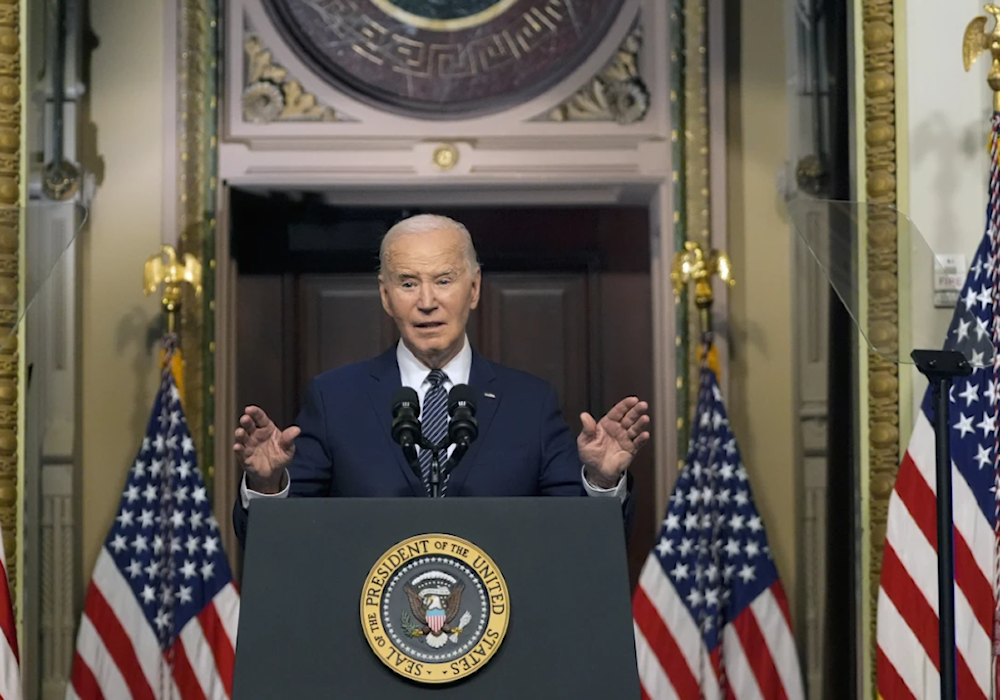Biden's approval rating in free fall over handling of war on Gaza
Over a quarter (23%) of Generation Z voters hold Biden primarily accountable for the humanitarian crisis in Gaza, and 22% of millennials blame him the most.
-

US President Joe Biden speaks about lowering health care costs in the White House in Washington on April 3, 2024. (AP)
According to three surveys done exclusively for Newsweek by Redfield & Wilton Strategies, US voters' dissatisfaction with US President Joe Biden's participation in the situation has increased dramatically since December.
The first survey of 1,500 eligible voters from around the country was conducted on October 29, 11 days following Biden's outspoken support of the Israeli occupation's war on Gaza, or as he likes to call it "self-defense".
The survey found that 37% of voters approved of his behavior and 35% disapproved.
Another poll on December 8 found that his approval rating spiked to 39% approval, compared to 33% who did not approve.
However, "much has happened since then," according to Newsweek.
Israeli strikes have killed over 33,000 Palestinians, including journalists, medical personnel, and aid workers.
Gaza is facing "unprecedented" destruction, and levels of hunger nearing famine, with most of its hospitals being completely out of commission due to Israeli raids and strikes.
In his State of the Union speech, Biden announced a plan to construct a port on the coast of Gaza to ease the flow of aid into the territory, and the US and its allies started to air-drop aid by parachute into Gaza.
More than half of respondents (51 percent) supported the policy in Redfield & Wilton Strategies' latest polling for Newsweek, which was conducted on March 23 to 24 with 1,500 voters, again with a 2.53 percent margin of error.
Just under a quarter (23 percent) "strongly" backed the plan, which was only opposed by 16%, yet the policy hasn't increased voters' positive opinion of Biden's handling of the Gaza crisis.
While Biden pledged to bring in more aid into Gaza, a futile endeavor since "Israel" continues to deny aid convoys and kills Palestinians awaiting it, only 44% of voters expressed that his efforts changed their opinion on how he handled the war.
Last month's poll indicated that Biden's approval rating fell from +6 in December to -9 points.
Biden's complicity in the war on Gaza has further contributed to his disapproval rating with 22% saying the President was greatly responsible, 23% saying "fairly" responsible, and 21% saying "somewhat responsible".
Over a quarter (23%) of Generation Z voters (born between 1997 and 2012) held Biden primarily accountable for the humanitarian crisis, and 22% of millennials (1981-1996) blamed him the most.
Osamah F. Khalil, a US foreign relations and Middle East expert, told Newsweek that youth and minorities, in particular, believe Biden's administration is complicit in the genocide.
"He appears to be avoiding college campuses. We haven't seen much of Kamala Harris, the vice president, either," Khalil noted.
Khalil added that despite "wringing Netanyahu's hand" in public, many voters believe the current administration is "absolutely hand in glove with what the Israelis are doing and what Netanyahu is doing."
Biden finally calls for Gaza ceasefire in call with Netanyahu
In a pivotal, unforeseen phone call that has been awaited for six months, Biden called on Netanyahu to start taking steps toward an immediate ceasefire in the Gaza Strip.
He underscored the gravity of recent developments, particularly condemning the strikes on humanitarian workers and highlighting the deteriorating humanitarian conditions in Gaza.
Biden emphasized the imperative for "Israel" to take immediate and decisive action to mitigate civilian harm, alleviate humanitarian suffering, and ensure the safety of aid workers, demanding the occupation to announce and implement a series of specific, tangible, and measurable measures aimed at addressing these pressing concerns, as well as commit to a ceasefire.
Furthermore, President Biden underlined that the trajectory of US policy toward Gaza would be contingent upon the occupation's prompt implementation of these proposed steps.
He reiterated the urgent need for an immediate ceasefire to stabilize the situation and prevent further harm to innocent civilians. Additionally, he urged Netanyahu to authorize his negotiators to swiftly conclude a deal aimed at securing the release of the Israeli captives.
In addition to discussing the situation in Gaza, the two leaders deliberated on the public threats issued by Iran against "Israel" and its citizens.
The United States has refused to call for a ceasefire in Gaza, essentially rendering it a pariah state in the international arena, especially among major powers, as it wasn't only not calling on "Israel" to commit to a ceasefire, it was also vetoing any UN resolutions aimed at urging for a ceasefire in Gaza.

 5 Min Read
5 Min Read








